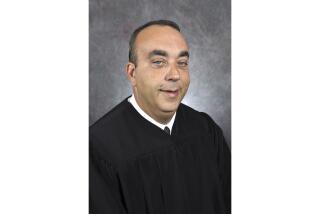‘Baby Doc’ Duvalier returns to tense Haiti
Jean-Claude Duvalier, the once-reviled dictator of Haiti known as Baby Doc, made a surprise return to this country Sunday evening, ending almost a quarter-century of exile and sending out shockwaves of speculation over his motives and intentions.
He arrives at a critical moment for a country still struggling to recover from last year’s catastrophic earthquake, and now locked in a political crisis that has left it unable to elect a new president.
It was unclear whether Duvalier, who has been living in Paris, plans to try to step into the political void. Though the former dictator was widely scorned when forced into exile in 1986 — a transition hailed as the end to the ruthless dynastic rule of the Duvalier family — a small group of supporters has recently sought to rehabilitate his image and revive his National Unity political party. Duvalier could attempt to capitalize on Haiti’s current misery by emphasizing the relative stability of the dictatorship years.
His return was unannounced, and he traveled on an Air France jet in first class, the Haitian newspaper Le Nouvelliste reported. He flew in to the Port-au-Prince airport, where he spent a couple of hours at immigration before being allowed to enter the country, according to Haitian national radio.
“I’ve come to help,” Duvalier was quoted as saying.
Now 59 and slightly balding, Duvalier later mounted the balcony of an upscale hotel in this capital’s Petionville district and waved to crowds that gathered to salute him.
As news spread of the arrival of “Baby Doc,” small groups of Haitians took to the streets in celebration — a sign perhaps of just how desperate the population has become. But his return could also portend even greater political convulsions. In some neighborhoods, a counter-rally cry went up, demanding the return of another exiled Haitian leader, the leftist populist former President Jean-Bertrand Aristide.
Duvalier returns as Haiti grapples with the results of a flawed Nov. 28 presidential election. A commission from the Organization of American States determined that the polling was riddled with fraud and that the government party’s candidate should be eliminated from the runoff.
That final round has been indefinitely postponed.
The international community has urged a quick resolution to the stalemate so that a new government can use a democratic mandate to jump-start sluggish earthquake relief and reconstruction projects. The earthquake killed about 300,000 people, and nearly a million Haitians still live in squalid camps scattered throughout the capital.
Outgoing President Rene Preval, whose term was to have ended on Feb. 7, is said to be unhappy with the OAS recommendations, further casting doubt on the way out of the crisis.
Duvalier has hinted at a return before. He expressed interest in running for election in the 2006 presidential race, trying to recover a job that had been granted to him “for life” at age 19 upon the 1971 death of his father, dictator Francois “Papa Doc” Duvalier. The elder Duvalier ruled the country with an iron fist for 14 years.
The younger Duvalier’s regime was characterized by brutal repression of opponents enforced by the notorious Tonton Macoutes secret police and the excessive lifestyle of the first family, who allegedly embezzled tens of millions of dollars. The chubby, baby-faced Duvalier lived as a playboy until marrying extravagant divorcee Michele Bennett Pasquet, who enjoyed the high life and alienated Haiti’s masses.
With hunger and poverty deepening, protests against the regime mounted in the early 1980s, along with ever-bloodier government crackdowns and international condemnation. The rebellion, along with pressure from the Reagan administration, drove Duvalier from power in February 1986. A U.S. Air Force jet took him and his wife to France, where they lived in exile on the Riviera until their divorce in 1993.
Haitians rejoiced at his ouster, but more bloodshed and military rule followed. Only in 1991 did Haiti finally get its first democratically elected president — Aristide — who was soon overthrown in a military coup.
It is uncertain how his return will play with a new generation of Haitians. Many of those who cut their teeth in political activism by opposing the dictatorship are aghast at Duvalier’s return, warning of political polarization in the nation. But some Haitians were receptive.
“The way the country is going now, it has to be for the good,” said Jean Sammy, 37, who was out Sunday night chanting in the streets.
Leslie Voltaire, an official with the reconstruction committee and a candidate in the November presidential election, said he welcomed the return of all Haitians from the diaspora — and predicted that Aristide won’t be far behind. “We need everyone,” he said. “The task is too great for us.”
Foreshadowing his pitch for a political recovery, Duvalier apologized in 2007 for the “mistakes” he had made as dictator.
Preval said at the time that his longtime enemy Duvalier would be welcome to return but would have to face justice for his many crimes against the Haitian people.
“This has taken everyone by surprise, including some of the members of government who are bewildered,” said Robert Fatton, a Haitian-born professor at the University of Virginia.
“If it is just Duvalier coming back, it could exacerbate the crisis. If it’s part of several [exiles] coming back as some sort of national unity [effort], that might be more positive.”
More to Read
Sign up for Essential California
The most important California stories and recommendations in your inbox every morning.
You may occasionally receive promotional content from the Los Angeles Times.











